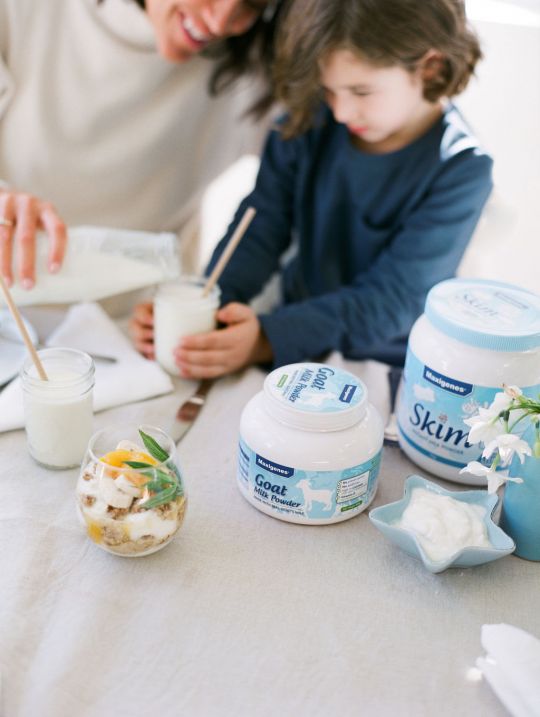
Blog BY Staff | 3 December 2020
Guide to Baking with Kids

Kids learn best when they are having fun, learning through play will help them practice skills that will stay with them for life, and what better way to do this through baking? Kids will be rewarded with tasty creations, whilst enjoying precious family time together. We have put together a useful guide to help you and your mini chef get started.
Preparation Is Key:
A good baker is a prepared baker, most recipes require a careful process to be followed so the science behind the baking process is successful and creates the right flavours and reactions. Luckily, with a few steps your baking creations are sure to succeed every time. Always aim to follow these steps:
- Read the recipe beforehand, read it out loud with your child so they can hear the process or if they are old enough, they can read it out. Whilst reading a recipe make sure it is clear to your child what you’re going to do and how they can participate, such as what they will be in charge of stirring or measuring.
- Have all the ingredients and utensils ready, placing the right utensil with the right ingredient and work in order. For example, measuring cups with flour and whisk with the eggs.
- Be prepared for mess and embrace it, having paper towels or a clean cloth on hand makes it easy to clean, reminding your child it is also best to clean up as you go. Big spills will be no drama if you are ready for it.
- Keep it simple, it may be tempting to start with some of the immaculate creations you see everywhere on social media. These bakers have taken years to perfect their skills, and they all started with simple cake or muffin mixes from a box. Look at baking recipes that have few ingredients and steps to get you start. See below for some ideas.
Practical Skills:
Baking certainly offers more than just delicious treats to eat, your child will be learning many practical skills and will help them practice some of those classroom lessons in real life as well. Here area few skills your mini chef will learn from baking:
- Math Skills – There are many mathematical concepts to be learnt during baking such as counting, wholes and fractions, volume and capacity the list can go on and on.
- Science Skills – Somewhere along the line we all learnt you needed baking soda to help baked goods ‘rise’ or if you replace butter with water you will get a very different recipe. Start with something simple like explaining temperatures and how to measure it and you will have your own mini scientist soon.
- Reading & Vocabulary – Baking recipes provide words that are important for cooking and life, and some demonstrations can help, such as what sifting looks like. Reading recipes will also help them follow instructions throughout life such as putting together furniture or fixing broken items.
- Fine Motor Skills – things we take for granted later in life such as holding a spoon, or the hand eye co-ordination required when stirring contents in a bowl all need time to development. Get your mini chef practising these skills early in life.
- Social Skills – Whether it be reading a recipe together, negotiating who’s turn it is to pour something or sharing their tasty treats with the family baking can bring everyone together in a fun and relaxed social environment.
Tasks for All Ages:
So, you have your aprons on, clean hands and all the ingredients out, now what? Different age groups require different level of baking tasks. Below is a general guide, parents should always consider what level their child is at and adapt, not the other way round, every child needs to start somewhere.
Ages 2 – 5:
Help toddlers and pre-schoolers graduate from kitchen playsets to the real thing, kids this age are curious and want to get hands on and dirty. Get them to:
- Scoop batter.
- Stir room temperature items.
- Knead doughs.
- Dump ingredients into mixing bowls, especially using their sense like feeling the ingredients and smelling spices like cinnamon.
Ages 6 – 8:
Children this age have had practice in the classroom with reading, maths and motor skills. Their way of thinking around concepts and processes is starting to form at a rapid pace. Have kids try:
- Greasing and flouring pans and tins for baking.
- Cracking eggs carefully.
- Whisking and folding in ingredients.
- Reading recipes and explaining stepsin a recipe.
Ages 9 – 12:
Start introducing children and adolescents to using the tools of the kitchen as kids this age are looking to become more independent. Also consider that children and teens have more patience and attention span (sometimes) for multistage and steps. They can look after:
- Using equipment such as electric beater, food processor or stovetop.
- Baking bread, waiting for dough to rise and proofing yeast.
- Execute recipe with minimal supervision or hands on instruction.
- Let them create their own recipes.
Recipe Ideas:
Needing some help in what recipes to start with? The below are some ideas to get your mini chef baking in no time:
- Cake packet mixes
- Brownies
- Lemonade scones
- Thumbprint jam biscuits
- Weet bix slice
Now that you are ready with your aprons, remember that baking is meant to be fun, and even if things don’t go to plan your mini chef still got to enjoy the time spent with family.
